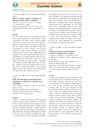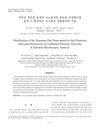 59 citations,
January 2010 in “Pharmacognosy Reviews/Bioinformatics Trends/Pharmacognosy review”
59 citations,
January 2010 in “Pharmacognosy Reviews/Bioinformatics Trends/Pharmacognosy review” Semecarpus anacardium Linn. has many medicinal benefits.
 45 citations,
January 2020 in “Pharmaceutical Biology”
45 citations,
January 2020 in “Pharmaceutical Biology” Dendrobium officinale polysaccharides may help with hair growth, skin moisturization, and protection against oxidative damage.
 24 citations,
January 2020 in “International Journal of Molecular Sciences”
24 citations,
January 2020 in “International Journal of Molecular Sciences” Some plants with flavonoids may help treat hair loss and promote hair growth.
 20 citations,
July 1988 in “Clinics in dermatology”
20 citations,
July 1988 in “Clinics in dermatology” Thioglycolate lotions are the most popular method for permanent waving and hair straightening.
 13 citations,
July 2016 in “BMC Complementary and Alternative Medicine”
13 citations,
July 2016 in “BMC Complementary and Alternative Medicine” Hominis Placenta helps hair grow back by increasing cell growth and a specific growth factor.
 8 citations,
January 2020 in “Skin appendage disorders”
8 citations,
January 2020 in “Skin appendage disorders” Saw palmetto supplements may modestly improve hair regrowth with few side effects, but more research is needed.
 8 citations,
March 2018 in “Cosmetics”
8 citations,
March 2018 in “Cosmetics” UV radiation damages hair by creating holes and peeling cuticle layers.
 6 citations,
April 2023 in “Frontiers in plant science”
6 citations,
April 2023 in “Frontiers in plant science” Certain bacteria can boost lentil growth and improve soil used for farming.
 3 citations,
January 2006 in “Eclética Química”
3 citations,
January 2006 in “Eclética Química” Three cost-effective methods accurately measure finasteride in pharmaceuticals, better than current techniques.
 36 citations,
October 2021 in “Frontiers in Endocrinology”
36 citations,
October 2021 in “Frontiers in Endocrinology” Insulin resistance and high male hormone levels are major causes of Polycystic Ovary Syndrome.
May 2024 in “Frontiers in Nutrition” Turning food waste into useful products is key for a sustainable economy.
14 citations,
December 2018 in “The American journal of pathology” Activating Nrf2 in skin cells speeds up wound healing by increasing the growth of certain stem cells.
5 citations,
July 2019 in “Nutrients” Low selenium intake may delay puberty in boys but not in girls.
3 citations,
April 2022 in “Biomolecules” Higher miR-34a levels and the A variant of the MIR-34A gene are linked to increased risk and severity of alopecia areata.
 24 citations,
May 2015 in “Schizophrenia Research”
24 citations,
May 2015 in “Schizophrenia Research” A drug improved schizophrenia-like symptoms in stressed rats by changing brain steroid levels.
 1 citations,
March 2011 in “Infertility”
1 citations,
March 2011 in “Infertility” Hormone imbalances from the pituitary, thyroid, and adrenal glands can cause infertility, but treating these disorders can improve fertility.
14 citations,
July 2017 in “Pakistan Journal of Zoology” Fenugreek leaf extracts significantly promoted hair growth in mice with alopecia.
 6 citations,
May 2022 in “Medicina-lithuania”
6 citations,
May 2022 in “Medicina-lithuania” IMA may indicate oxidative stress in skin and hair disorders, but more research is needed.

The new gel with Zinc Oxide nanoparticles and finasteride shows promise for treating hair loss when applied to the skin.
 21 citations,
July 2010 in “International Journal of Cosmetic Science”
21 citations,
July 2010 in “International Journal of Cosmetic Science” Older people's hair becomes less shiny because it gets more uneven and curved.
 20 citations,
February 2001 in “Dermatologic Surgery”
20 citations,
February 2001 in “Dermatologic Surgery” Micropigmentation effectively hides scalp scars with few complications.
 9 citations,
January 2010
9 citations,
January 2010 The herbal hair dye is a safe and eco-friendly alternative to conventional dyes.
 2 citations,
June 2019 in “Facial Plastic Surgery”
2 citations,
June 2019 in “Facial Plastic Surgery” Medical tattooing improves appearance and quality of life, but has potential risks.

The document is a detailed guide on skin conditions and treatments for dermatologists.
 March 2012 in “Korean Journal of Microscopy”
March 2012 in “Korean Journal of Microscopy” Quantum dot nanoparticles can penetrate skin and reach sebocytes through hair follicles.

Doctors recommend postoperative radiation for male breast cancer, advise against testosterone for vasomotor symptoms post-adrenalectomy, suggest non-hormonal treatments for atrophic vaginitis after mastectomy, note no specific treatment for anticoagulant-induced hair loss, and call for more research on silicosis from silicon carbide exposure.
71 citations,
June 2007 in “Bioorganic & Medicinal Chemistry Letters” PLGA nanospheres improve hair growth by effectively delivering ingredients to hair follicles.
144 citations,
December 2017 in “Pigment cell & melanoma research” Melasma is now considered a skin aging disorder caused by sun exposure in people with a genetic tendency, which impacts treatment and prevention approaches.
 6 citations,
October 2018 in “Lasers in Medical Science”
6 citations,
October 2018 in “Lasers in Medical Science” Low-level laser therapy using near-infrared light may help heart conditions and promote healing by releasing nitric oxide.
 39 citations,
September 2013 in “Journal of Cosmetic Dermatology”
39 citations,
September 2013 in “Journal of Cosmetic Dermatology” Herbs can potentially treat hair loss by inhibiting a key enzyme and promoting hair growth, and deficiencies in zinc, biotin, and iron are linked to hair loss.























